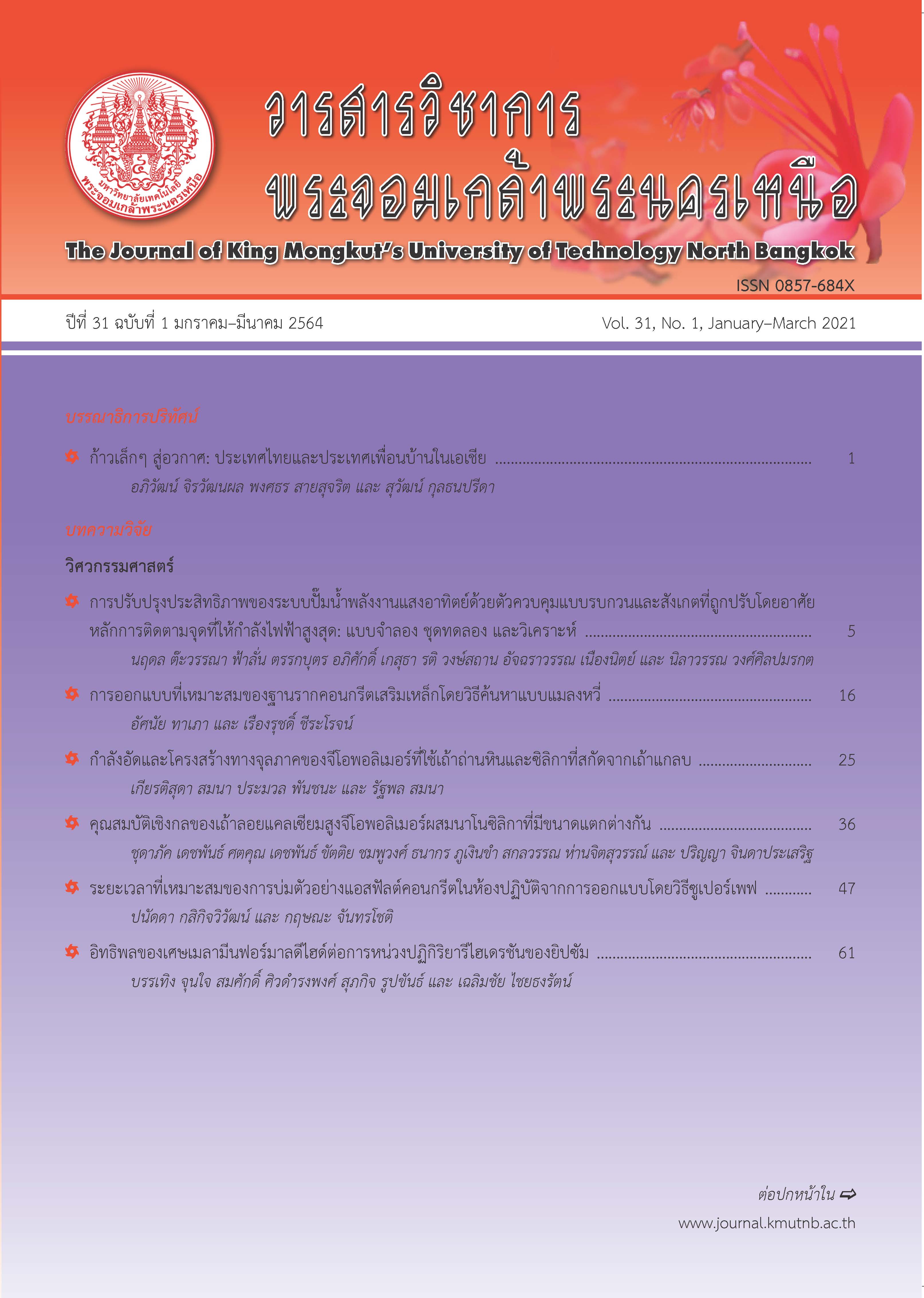การพัฒนาออนโทโลยีสำหรับผลิตภัณฑ์อาหารแปรรูปของกลุ่มวิสาหกิจชุมชน
Main Article Content
บทคัดย่อ
งานวิจัยนี้มีวัตถุประสงค์เพื่อพัฒนา และประเมินประสิทธิภาพของออนโทโลยีสำหรับผลิตภัณฑ์อาหารแปรรูปของกลุ่มวิสาหกิจชุมชน ทำการถอดความรู้เกี่ยวกับผลิตภัณฑ์อาหารแปรรูปของกลุ่มวิสาหกิจชุมชน โดยศึกษาข้อมูลจากแหล่งต่างๆ และสัมภาษณ์ผู้เชี่ยวชาญด้านการแปรรูปอาหาร ทำให้ได้องค์ความรู้แบบมีโครงสร้างและองค์ความรู้แบบไม่มีโครงสร้างโดยขั้นตอนของการพัฒนาออนโทโลยีประกอบด้วย 1) ระบุขอบเขตและวัตถุประสงค์ 2) สร้างคลาสและความสัมพันธ์ 3) กำหนดคุณสมบัติของคลาส 4) กำหนดความสัมพันธ์ระหว่างมโนทัศน์ 5) กำหนดเงื่อนไขและข้อกำหนดข้อมูล 6) กำหนดค่าตัวแทนข้อมูล และ 7) ตรวจสอบออนโทโลยีโดยผู้เชี่ยวชาญ การประเมินออนโทโลยี โดยผู้เชี่ยวชาญประกอบด้วย ส่วนที่ 1 การประเมินความเหมาะสมของออนโทโลยี ผู้เชี่ยวชาญมีความเห็นว่า ออนโทโลยีมีความเหมาะสมอยู่ในระดับมากที่สุดมีค่าเฉลี่ยเท่ากับ 4.54 และส่วนเบี่ยงเบนมาตรฐานเท่ากับ 0.40 ออนโทโลยีมีความถูกต้องเหมาะสมต่อการนำไปใช้งาน และส่วนที่ 2 การประเมินประสิทธิภาพการสืบค้นข้อมูลของออนโทโลยี ผลการประเมินออนโทโลยีพบว่า ค่าเฉลี่ยความแม่นยำ (P) เท่ากับ 0.84 ค่าเฉลี่ยความระลึก (R) เท่ากับ 0.76 และค่าประสิทธิภาพโดยรวมเท่ากับ 0.80 สรุปว่า ออนโทโลยีสามารถจัดเก็บผลิตภัณฑ์อาหารแปรรูปของกลุ่มวิสาหกิจชุมชนเป็นฐานความรู้ และการสืบค้นข้อมูลทำได้อย่างถูกต้องแม่นยำ
Article Details
บทความที่ลงตีพิมพ์เป็นข้อคิดเห็นของผู้เขียนเท่านั้น
ผู้เขียนจะต้องเป็นผู้รับผิดชอบต่อผลทางกฎหมายใดๆ ที่อาจเกิดขึ้นจากบทความนั้น
เอกสารอ้างอิง
[2] R. Akanit, T. Putthapongsiriporn, N. Lumdabwong, and A. Thunkijjanukij, “Ontology development for rice processing knowledge management,” Journal of Agriculture, vol. 27, no 23, pp. 267–274, 2011 (in Thai).
[3] J. Chaikhambung and K. Tuamsuk, “Development of semantic ontology of knowledge on ethnic groups,” TLA Research Journal, vol. 10, no. 2, pp. 1–15, 2017 (in Thai).
[4] S. Staab and R. Studer, Handbook on Ontologies, second ed., New York: Springer, 2009, pp. 1–20.
[5] B. Swartout, R. Patil, K. Knight, and T. Russ, “Toward distributed use of largescale ontologies,” in Proceedings AAAI-97 Spring Symposium Series Conference, 1996, pp. 138–148.
[6] A. Gomez-Perez and V. Richard-Benjamins, “Applications of ontologies and problemsolving methods,” AI-Magazine, vol. 20, no. 1, pp. 119–122, 1999.
[7] N. F. Noy and D. L. McGuinness, “Ontology development 101: A guide to creating your first ontology,” Stanford Knowledge Systems Laboratory Technical Report KSL-01-05 and Stanford Medical Informatics Technical Report SMI-2001-0880, March 2001.
[8] J. Brank, M. Grobelnik, and D. Mladenic, “A survey of ontology evaluation techniques,” in Proceeding of the Conference on Data Mining and Data Warehouses, 2005, pp. 1–4.
[9] P. Tangtrakul, “Unit 6: Processing agricultural products for food,” in Agricultural Products and Processing Management, Bangkok: Sukhothai Thammathirat Open University, 2011 (in Thai).
[10] S. Banchongsiri, B. Mongjongklang, and P. Kandee “Developing community enterprises following the sufficiency economy philosophy,” Electronic Journal of Open and Distance Innovation Learning, vol. 1, no. 15, pp. 178–197, 2011 (in Thai).
[11] S. Chansuk, “Benefits and success factors of provincial groups in development,” Community Development Journal, vol. 54, no. 12, pp. 17–19, 2014.
[12] R. Baeza-Yates and B. Ribeiro-Neto, Modern Information Retrieval. New York: Addison-Wesley, 1999, pp. 73–82.
[13] K. Kunprajuab and N. hamnongsri, “The development of a dietary supplement product ontology,” Journal of Information Science, vol. 34, no. 1, pp. 94-121, 2016 (in Thai).
[14] K. Warongporn, “The development of a cultural tourist attraction ontology,” M.S. thesis, Department of Science (Information Technology), Suranaree University, 2014 (in Thai).
[15] M. Buranarach, T. Supnithi, Y. M. Thein, T. Ruangrajitpakorn, T. Rattanasawad, K. Wongpatikaseree, A. O. Lim, Y. Tan, and A. Assawamakin, “OAM: An ontology application management framework for simplifying ontology-based semantic web application development, international,” Journal of Software Engineering and Knowledge Engineering, vol. 26, no. 1, pp. 115–145, 2016.
[16] A. Thunkijjanukij, A. Kawtrakul, S. Panichsakpatana, and U. Veesommai, “Ontology development: A case study for Thai rice,” Kasetsart Journal Natural Science, vol. 43, no. 3, pp. 594–604, 2009 (in Thai).
[17] C. Prompukdee, M. Buranarach, and J. Rungrattanaubol, “System for searching Thai traditional medicine treatment information using ontology knowledge,” Journal of Social Sciences, vol. 4, no. 2, pp. 61–70, 2015 (in Thai).
[18] T. Pinthongpan, “The application of ontology technology for ecotourism information searching system in lower-southern Thailand,” M.S. thesis, Special Program in Management of Information Technology, Faculty of Engineering, Prince of Songkla University, 2014 (in Thai).

